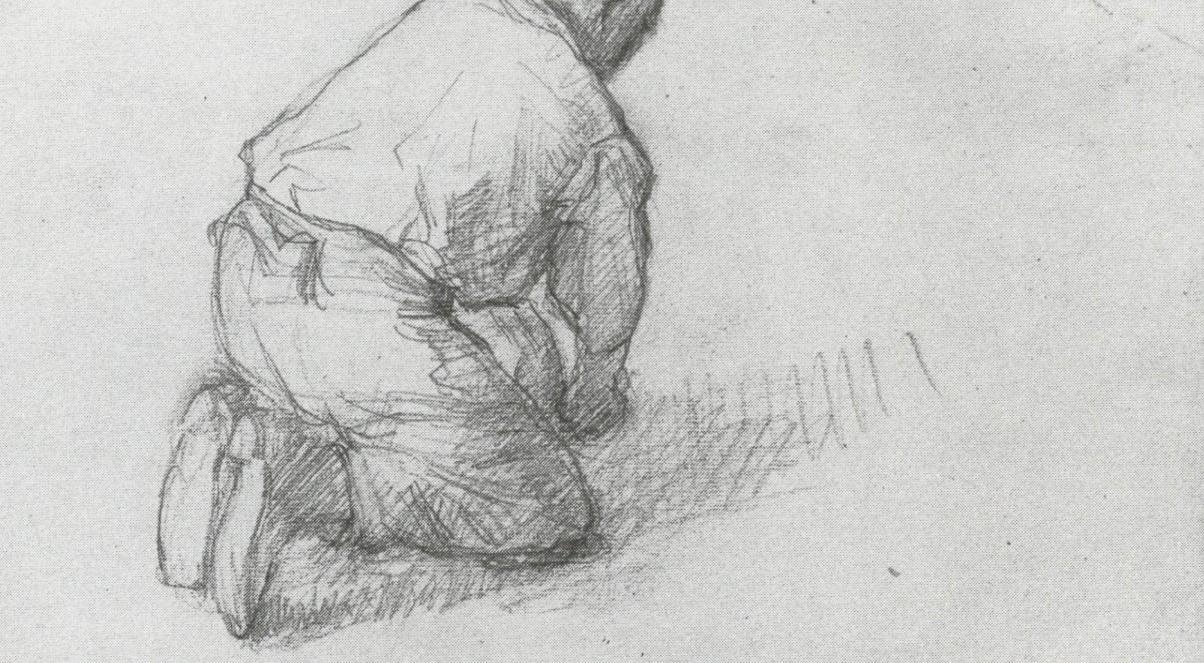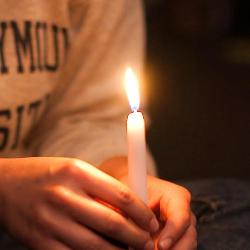
Thursday, June 11: goputyourselfonyourknees
Learning, forgetting, remembering, retrieving: Bryant Keith Alexander, Ph.D., Dean of the College of Communication and Fine Arts, reflects on prayer, the lessons his mother taught him, and the renewed resonance of her directive: "goputyourselfonyourknees."
“goputyourselfonyourknees”
Bryant Keith Alexander
My mother was what many in my childhood neighborhood would call a “good Catholic girl.” For her seven children raised in a small two-bedroom house in Lafayette, Louisiana -- she made sure that God was present in our house and in our lives. I honor her spirit every time I go to church: I honored her in the years of serving as an altar boy, in the years of singing in church choirs, in the years of teaching catechism, in the years of serving as a lecturer, and in the years of serving as a eucharistic minister. I honor her and the faith that she taught me.
One of the deep and important memories of my mother that has been present for me lately is that my mother was the one who taught me how to pray. Sometimes in collective family prayer when little bodies lined up in the church pew on Sunday, and other holy days of obligation, but also when those same small and growing bodies lined up along the couch in our home. My mother made us pray the rosary. And my mother made us take turns saying The Lord’s Prayer softly and with reverence. She would often say, “Slow down. Say it with meaning. Say it with belief and not just as another thing memorized and recited.” “Stop”, she would say, “Start again.” “Do you believe what you just said? It’s not just the Lord’s prayer that he gave to us. It is your prayer that you give to the Lord.” And in that lesson, she would often ask us to shift the plural to the particular, from our to my father. It was a lesson to particularize prayer, and when shared in a community of faith, the “our” and the “us” would have a depth of collective meaning that all who profess those words -- shared a common faith and commitment to one God.
One of the greatest sins that we could commit as kids, was being unkind to each other. Fighting, name calling or disrespecting each other as siblings ended with two phrases. First, “When mommy and daddy are gone, all you will have is each other. So, love one another.” Second, she would say, “Goputyourselfonyourknees.” A phrase delivered with such quickness and often with such pain, that the words blended into one single utterance that pointed to a place and action: “Go put yourself on your knees” and pray for forgiveness. And we knew what we had to do and where; a corner of the living room under the image of a crucified Jesus. She required a slow repetition of The Lord’s Prayer with emphasis on the particular: “my father”, “give me”, “my daily bread”, “forgive me, as I forgive those who trespass against me”, “Lead me not into temptation” and “deliver me from evil.” I remember those directives as both punishments and forced moments of reflection; maybe moments of discernment using my prayer to the Lord as a means of contemplating my actions that brought me to that moment, and to imagine what would be the difference in me that would follow prayer.

Over the years, while I continued to say prayers, I believe that until recently I didn’t realize that I had forgotten how to pray. I moved back into the reciting of memorized lines getting caught up in the delivery of the script or the collective recitation of a congregational chant. Sometimes even feeling a little frustrated with the a-syncopated rhythms of others collectively reciting The Lord’s Prayer. Until recently, I had forgotten the lessons on my knees with my mother saying, “Slow down. Say it with meaning. Say it with belief and not just as another thing memorized and recited.” “Stop”, she would say, “Start again.” “Do you believe what you just said? It’s not just the Lord’s prayer that he gave to us. It is your prayer that you give to the Lord . . . He is listening.” And when said in a congregation of others, it becomes a chorus of faith with its own harmonies of community activity.
Recently, I took part in an 8-week season-of-Lent program entitled “Meeting Christ in Prayer” sponsored through the LMU Center for Ignatian Spirituality. Our small threesome gathered for once a week meditations and contemplation. We would key in on the lessons taken from the readings of the week and give voice to our feelings; differently but always co-informing. These were vulnerable moments of shared reflection in which each found their own personal process of sense-making and their own orientation to meeting Christ in prayer. During that time, I began to remember. I began to remember my mother’s lessons. And I began to learn how to pray again. Our sessions always began by reading together, and in the company of each other, A Prayer by St. Anselm of Canterbury. The prayer has touched a place in my heart and has reminded me of my mother’s lessons in prayer as a direct address to the Lord. It reads:
O my God, teach my heart where and how to seek You,
where and how to find You.
You are my God and You are my all and I have never seen You.
You have made me and remade me,
You have bestowed on me all the good things I possess,
Still I do not know You.
I have not yet done that for which I was made.
Teach me to seek You.
I cannot seek You unless You teach me
or find You unless You show Yourself to me.
Let me seek You in my desire,
let me desire You in my seeking.
Let me find You by loving You,
let me love You when I find You.
Amen.
And now, every day, I take my mother’s directive-- “Goputyourselfonyourknees” as ritual practice. Not as a punishment but as a possibility of finding myself again in faith and prayer. My mother would be tickled because I also purchased a prayer kneeler that I have placed in the corner of my home office. There, “I put myself on my knees” voluntarily in a daily examen of my own being and becoming in Christ.
Bryant Keith Alexander, Ph.D. is Dean, College of Communication and Fine Arts, Loyola Marymount University. He writes and researches in the areas of Communication Studies, Performance Studies, Race/Culture/Gender Studies, and Educational Studies.

